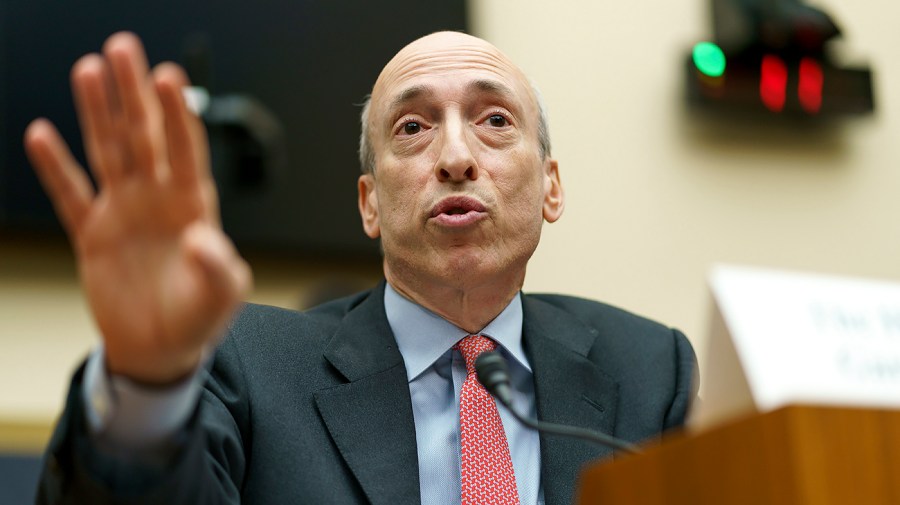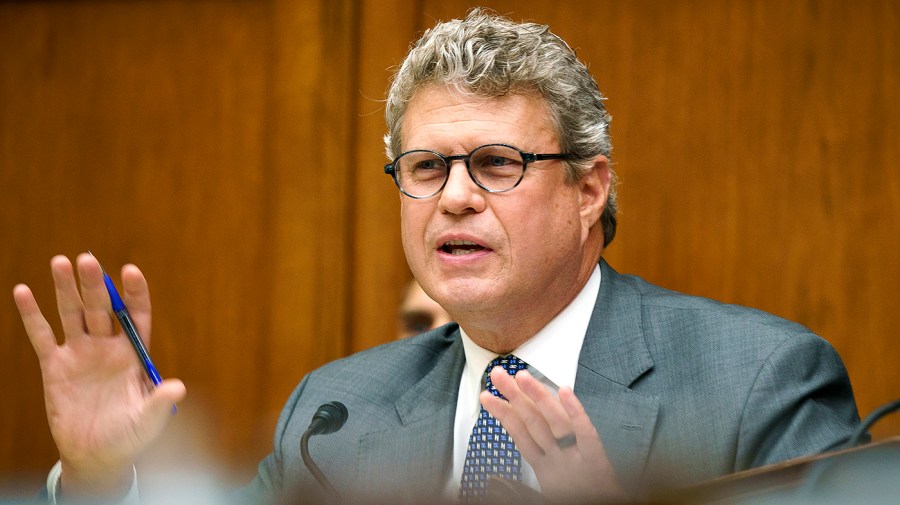Republicans rip SEC chief for crypto lawsuits, climate rules
Securities and Exchange Commission (SEC) Chairman Gary Gensler defended his aggressive regulatory agenda from a wave of Republican attacks during Tuesday’s House Financial Services Committee hearing.
Republicans blasted the SEC’s lawsuits against cryptocurrency firms under Gensler’s tenure and accused him of refusing to comply with congressional requests for documents.
GOP lawmakers on the panel took aim at Gensler’s proposed market overhauls, including regulations to tighten rules for crypto firms and mandate disclosure of public companies’ climate change risk. They noted that Gensler has proposed more than twice as many rules as his predecessors.
Flashback: Gensler compares cryptocurrency market, regulations to ‘wild west’
Tuesday marked Gensler’s first appearance before the panel since October 2021, and his first under GOP control of the House.
Gensler made the case that U.S. capital markets are the strongest and most secure in the world because of its robust rules. He said that new innovations are putting investors at risk, spurring the need for updated rules.
“The SEC is the cop on the beat watching out for your constituents,” he told lawmakers.
Republicans grill Gensler on crypto

Rep. Patrick McHenry (R-N.C.), the committee’s chairman, blasted Gensler’s SEC for launching more than 50 enforcement actions against crypto companies.
He said it’s irresponsible for the SEC to sue the firms for failing to register with the SEC when the law isn’t clear about if certain digital assets are securities or commodities. The Commodity Futures Trading Commission (CFTC) has sparred with the SEC over which agency has authority over certain cryptocurrencies.
Crypto meltdown: Crypto faces a crisis of confidence amid FTX collapse
“You’re punishing digital asset firms for allegedly not adhering to the law when they don’t know it will apply to them. It’s nonsensical,” McHenry told Gensler.
When pressed by McHenry to define whether ethereum, the second-largest cryptocurrency, is a security or a commodity, Gensler refused to answer, only stating that a token is a security when investors expect a profit from it.
“There’s a lack of clarity here in the marketplace. Can you at least agree to that?” McHenry said.
Gensler responded that it’s clear the SEC has the authority to regulate crypto, leaving McHenry visibly frustrated.
“Does it concern you that your approach to the digital asset industry is actually driving this industry out of the United States?” Rep. Tom Emmer (R-Minn.), a top crypto ally, asked Gensler.
“I’m trying to drive it to compliance and if they’re not complying with the laws then they shouldn’t be offering their products to U.S. investors,” Gensler responded.
The crypto industry has lashed out at Gensler, accusing him of creating a hostile environment for crypto that is forcing digital asset firms, including failed crypto exchange FTX, to move their operations abroad.
Gensler told lawmakers that the crypto market is “rife with noncompliance” and insisted that the SEC doesn’t need additional authority from Congress to regulate crypto.
“This noncompliance not only puts investors at risk, but also puts at risk the public’s trust in our capital markets,” Gensler said.
The crypto industry has suffered from a wave of bankruptcies that have undermined public confidence in digital assets.
Disgraced FTX founder Sam Bankman-Fried worked closely with lawmakers to draft a bill intended to be first comprehensive crypto regulatory law, which would have handed enforcement to the CFTC rather than the more powerful SEC.
Rep. Brad Sherman (Calif.), the top Democrat on the capital markets subcommittee, said that lawmakers should pass legislation to categorize all crypto assets as securities.
“That way it would be very clear that investors in crypto get the same protection as investors in stock, bonds and other intangible assets acquired for an investment purpose,” Sherman said.
Business groups also fighting SEC agenda

Republicans are largely allied with corporate America in their push to delay, modify or scrap SEC proposals that they say would undermine U.S. competitiveness.
The U.S. Chamber of Commerce sent a recent letter to the committee taking aim at Gensler’s aggressive regulatory agenda, noting that his 53 proposed regulations are “twice as many rules as his predecessor in just half the time.”
“The barrage of rulemaking at the SEC is unprecedented and merits the close scrutiny of Congress,” Tom Quaadman, executive vice president of the Chamber’s Center for Capital Markets Competitiveness, told lawmakers.
Quaadman, who provided lawmakers with a list of questions for Gensler, cited an October SEC inspector general report raising concerns about the agency’s ability to carry out the large number of proposals. The report pointed to attrition among SEC staffers.
“I get the impression from personnel across the SEC that there are concerns about the high volume and the fast pace of this rulemaking. Let’s try to get it right, not get it done in a hurry,” Rep. Frank Lucas (R-Okla.) told Gensler on Tuesday.
The National Association of Manufacturers sent a letter to committee members Tuesday criticizing the climate disclosure rule, arguing that it would “substantially increase compliance costs and legal risks for public companies.”
The lobbying group called on the SEC to ax a provision that would place new reporting burdens on private businesses that are part of a public company’s supply chain.
Gensler said Tuesday that the SEC is taking those comments into consideration when crafting its rule. He said that the rule is not intended to put obligations on nonpublic companies.
“We’ve gotten 15,000 comments. On the investors’ side, it’s almost uniformly supportive of mandating climate risk disclosures,” Gensler told lawmakers.
Democrats largely defended Gensler throughout the hearing, urging him to ensure the proposed rules remain strong following public comment periods.
“These reforms are not being rushed. They are long overdue,” said Rep. Maxine Waters (D-Calif.), the committee’s ranking member. “Meanwhile, Republicans are eager to rush forward with measures that would deregulate our capital markets.”
Republicans rip Gensler over transparency

Throughout the tense hearing, Republicans expressed frustration that Gensler wouldn’t give them straight answers. They added that Gensler has failed to adhere to congressional inquiries.
Rep. Bill Huizenga (R-Mich.) said that when he asked for documents relating to the SEC’s rule to mandate disclosure of climate-related risks, the agency provided only publicly available information, including a letter from Huizenga and McHenry congratulating Gensler on his confirmation.
“I have that one in my file already,” Huizenga told Gensler. “Frankly, it’s insufficient and unacceptable what has been going on.”
Huizenga and McHenry also sent a recent letter to Gensler requesting more information about the SEC’s charges against Bankman-Fried. Republicans have accused him of failing to prevent FTX’s collapse.
Gensler said Tuesday that he is obliged to keep investigative matters confidential.
Copyright 2023 Nexstar Media Inc. All rights reserved. This material may not be published, broadcast, rewritten, or redistributed. Regular the hill posts







